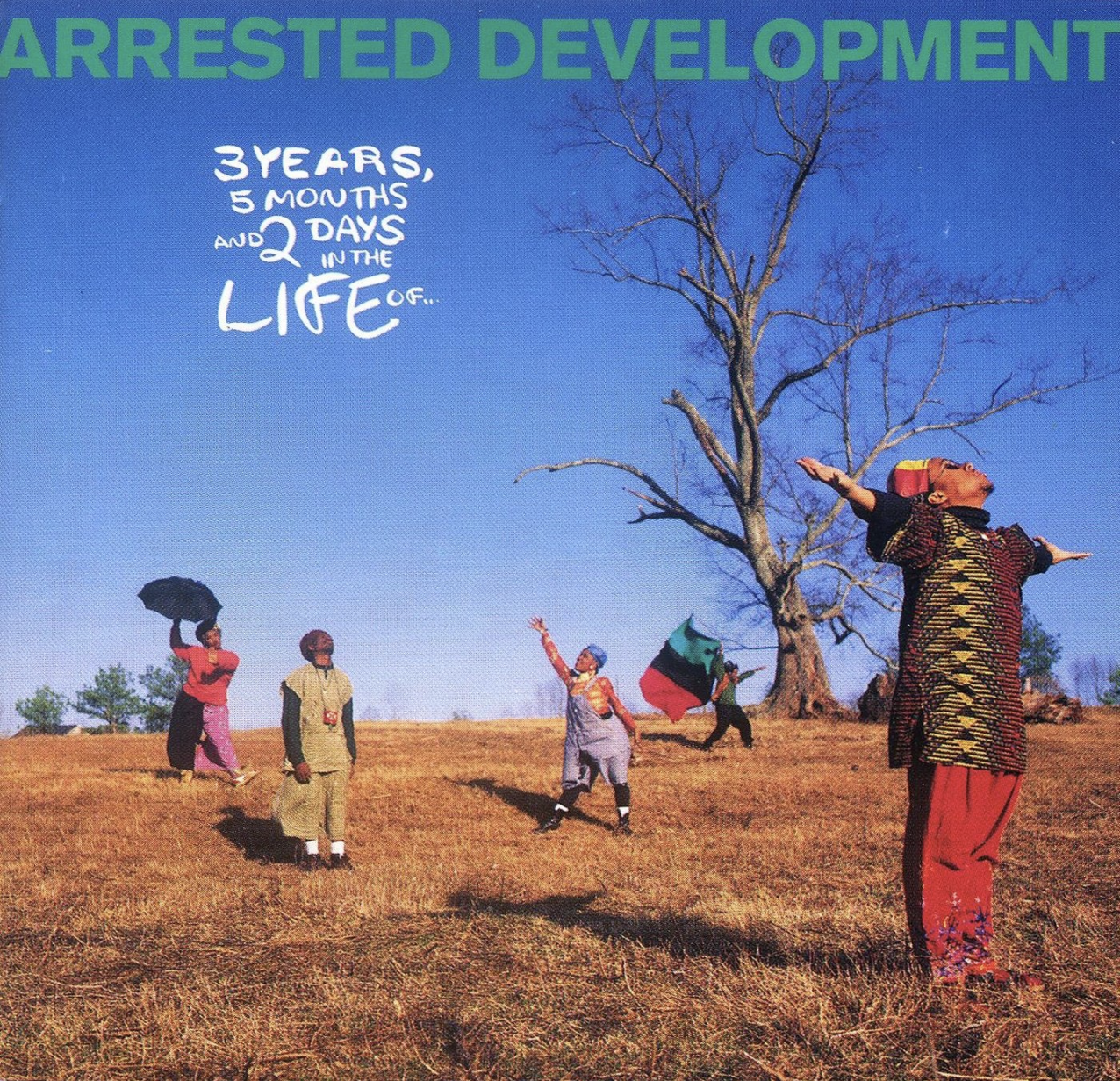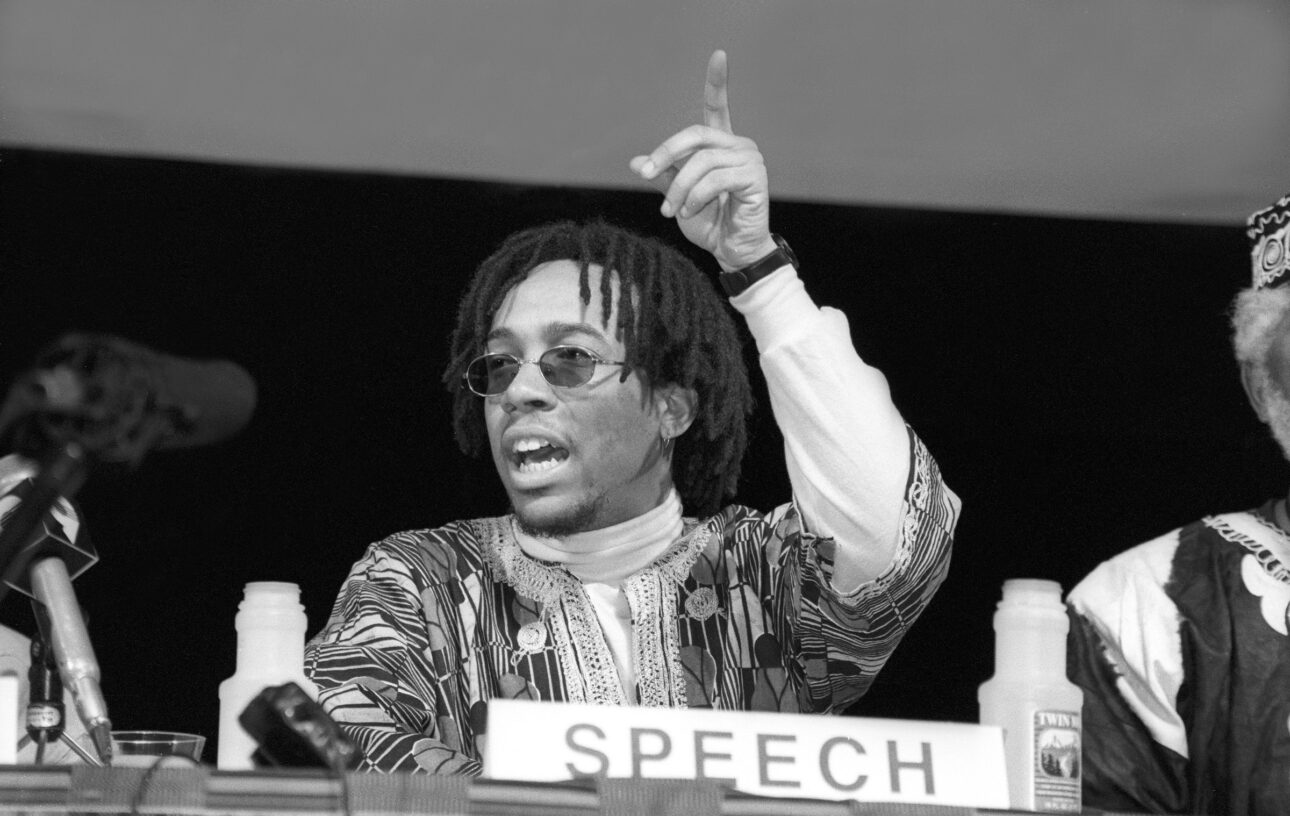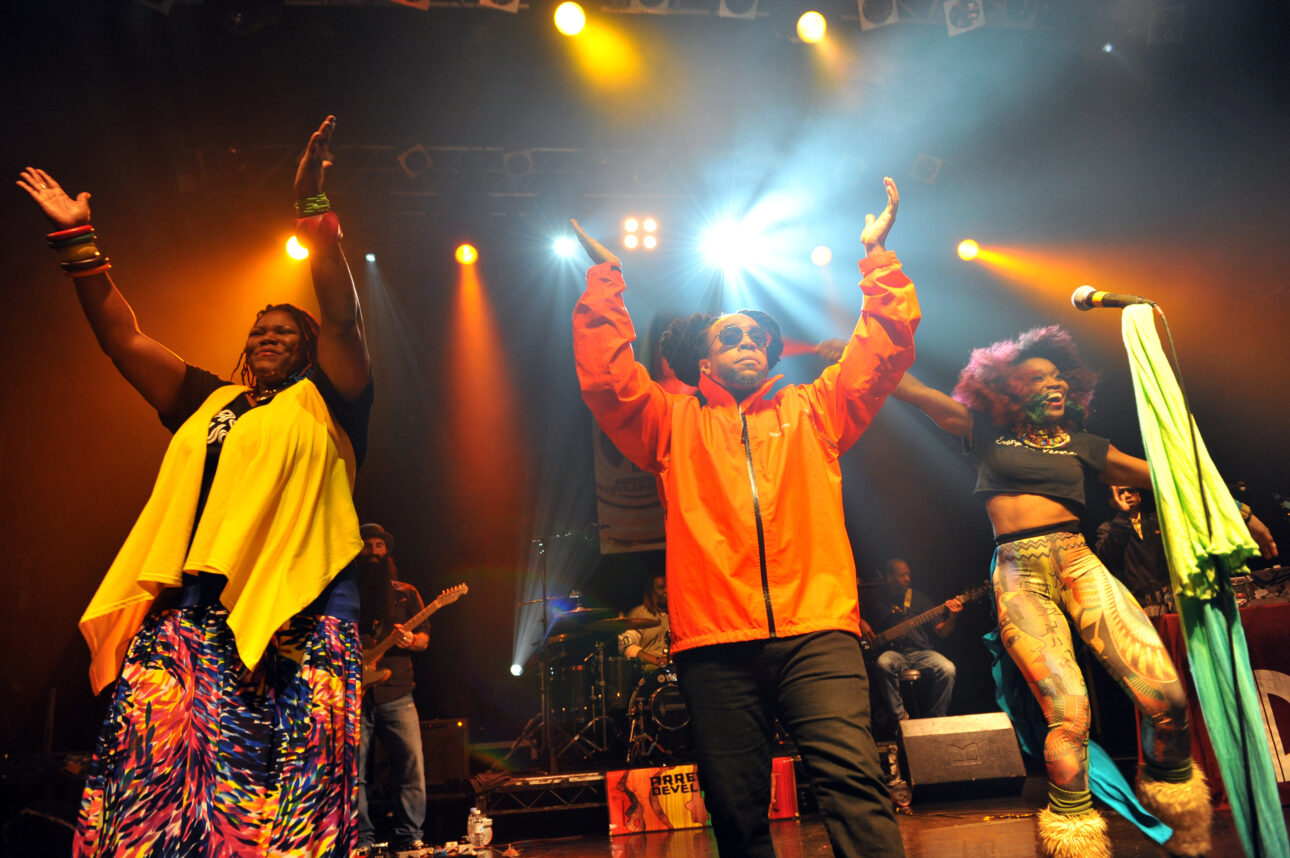Speech still chokes up when he talks about it, more than 30 years after his older brother and grandmother died within days of each other, inspiring what would become Arrested Development’s biggest hit, “Tennessee.” The pain of losing them hasn’t subsided. Twenty-two at the time, he was forced to grapple with his grief. It took an hour to write the lyrics to “Tennessee,” the lead single from Arrested Development’s 1992 debut album, 3 Years, 5 Months and 2 Days in the Life Of…


Speech, born Todd Thomas, couldn’t have imagined the song would have such a seismic impact on not only his life but also Southern hip-hop. At the time of its release, the raunchy Miami bass sound of 2 Live Crew and the street-savvy, gritty Houston rap of the Geto Boys were more indicative of the South. And it would take two more years for Atlanta-based production crew Organized Noize to shake things up with Outkast’s pioneering Southernplayalisticadillacmuzik. So when Arrested Development stepped on the scene in 1991 with their vibrant Afrocentric clothing, philosophical lyrics, and genre-melding sonic gumbo, they unequivocally stood out.
“Tennessee” peaked at No. 6 on the Billboard Hot 100, hit No. 1 on the R&B/Hip-Hop singles chart, and won the Grammy Award for Best Rap Performance by a Duo or Group in 1993. The album was certified platinum by the Recording Industry Association of America (RIAA) and has allowed the various iterations of Arrested Development to tour the world multiple times over.
I spoke to Speech about the origins of the song and how he feels about it today.
Tennessee
It was an extremely hard time. My grandmother had just passed. I used to spend all my summers with my grandmother in Tennessee, in this small town called Glimp. I was there every summer, and it was the most formative time of my life. So when she passed, it was very hard. There was a lot of soul-searching, a lot of pain.
My whole family went down to Tennessee for her funeral, including myself, my mom, dad, adopted brother, and my biological brother, Terry. It was good to see my brother because he’s seven years older than me and I hadn’t seen him in awhile. He was off in college, doing medical school and stuff like that. He’d become a doctor and was practicing in Pittsburgh. We left that funeral, and that same week he died. He was 29, hadn’t even made it to 30. He died of an asthma attack, and it was 100 percent unexpected.
Come Home
Terry was at the hospital, and he had an asthma attack. He thought he had a little more time to finish up what he was doing. It got worse, and his chest got tighter, until finally he took a pill that would help him breathe better. The pill, however, took a little time to kick in, and that pill is known for that, but he had really underestimated how serious the attack was. I think he was just so dedicated to the work. He called his fiancée, and she came and picked him up, but he died in the car on the way home.
I got the news while I was on a date. I lived in Milwaukee at the time and was going to the University of Wisconsin-Milwaukee. My mother called, and she was calm. She said, “I need you to come home.” So I dropped my date off and pulled up to her house, where I was living. Every light was on in the house. It was nighttime. I could see my adopted brother pacing back and forth. I walked in, and everything just went silent.
My mom told me that my brother died. I was just totally destroyed. My whole life I looked up to him. He was literally my hero, and when he died, it was so close to my grandmother’s [death] that everything was in question for me. It almost felt like the Book of Job in the Bible, where so many things were going wrong so close to each other that nothing felt right. Nothing felt guaranteed. My mother being alive next week, my father being alive next week, my brother, anything that I counted on, anything that meant something of validity to me, all became questionable because things were just happening so fast and so big.


Auto-Pilot
We mourned and had a funeral. I wrote another song called “Terry,” but I never released that song. It was just an amazingly emotional song. I never even pitched it to the group. But I wrote the song “Tennessee” that same week after my brother’s funeral. That song seemed to just download into me. It seemed like every word was just what I was feeling, and everything flowed. I wrote that song probably within one hour after I made the beat. I made the beat first, and it was the word “Tennessee” from Prince’s “Alphabet St.” He said, “I want to put her in the back seat and drive her to Tennessee.” I used that as the anchor of the location that I last saw my grandmother and brother, so the lyrics just started pouring out of me.
Pushing Through
It was extremely difficult, and I cried more times than I could say writing and recording the song. But when I finished recording it, one of the group members, Aerle Taree, came over to my house. I needed a brief detour. Let’s say you’re going to someone’s funeral on a road trip, but on the way to that hard reality that you’re about to face at the funeral, you stop off at a nature park and take a little detour or a break from the realities of what the road trip is really about. To me, that’s what Aerle Taree did in the middle of the song. It’s just a release for a moment. And even at the end, she does a lot of talking. All of that was necessary for that song to be what it was. And of course, Dionne Farris’ [vocal] solo.
And Boom, Just Like That
The song was obviously extremely personal, but I also knew that it was extremely dope. I knew it was really groundbreaking and extremely dope for hip-hop. And I’m a hip-hop producer, so producing these beats, I knew they were banging. I knew lyrically that I was going at it in a very unique way. I knew it was capable of adding something new to hip-hop, but also it was capable of sort of pulling at the musical tastes of those who like folk, alternative, or R&B music. I knew that there were elements of what this song is that would resonate, or at least could resonate, with so many different pockets and tribes of people out there.
I remember when I finished writing it, I was in the car with one of my good friends, a guy named Hoover I used to hang with all the time, and he was like, “Man, this song is crazy!” And I remember thinking to myself, “This is crazy!” And I’m riding in the ghettos of Milwaukee, Wisconsin, which is where I was at at the time, and I’m like, “Yo, this song is so needed for the culture. This song is so needed.”
That was in late ’91 when I was saying that to myself. I was just hoping that it would do great. So when it did great, it was mind-blowing. It came in stages because, as charts go, it enters in at whatever number it enters in at, and then it goes up the charts. It was our first single ever as a group, so it was like witnessing numerous things at the same time. I’m witnessing the fact that we’re even out here as a group, so that’s just an achievement, especially in the early ‘90s, when you didn’t have Internet and you couldn’t just release a single that you just made on your laptop and throw it out on YouTube or whatever. It was a process. Getting signed to a major label in general was part of “making it,” like, “Oh, we’ve got a deal.” The fact it was climbing the charts and reached No. 1 on all of the charts except the pop charts was a feeling of elation.
That release changed my life in more ways than I could even express.


Welcome to Atlanta
You’d have to ask a lot of other people how they felt the song impacted Atlanta. What I can say being inside my own body and my own skull is that we filmed the “Tennessee” video in Georgia. So just to back up slightly, when I wrote the song I was in Milwaukee, but when it was time to shoot the video, I had already moved to Atlanta. So I’m back with all the group members, and we shoot the video in the countryside of Atlanta, and you see this huge spotlight being put on the South. And what I mean by the South in this instance is sort of like the rural South, like Tennessee, Kentucky, and Georgia. The backwoods South. Our whole motif—the overalls, patches on our clothing, and the scenery of this rural sort of farm-looking type of area—was different. The Southern symbolism had never been done in hip-hop.
To my knowledge, and any historians can correct me if I’m wrong, but to this day I haven’t found any hip-hop record that existed at that time or before that time that had a woman singing a solo, not just singing a chorus or something like that, but singing a solo and emoting her feelings on a hip-hop record. I don’t know of a male either. It was just so many new things about it that hit the world all at once.
Black & White Vision
The label gave us $19,000 to shoot the video. We hired a man named Milcho Manchevski. We talked to three different directors, but we hired Milcho because he had this idea that he wanted to make the video look like a photo, like a high-quality, black-and-white photo. There was a particular person [whose books we were looking at], a particular photographer—I forget his name now—who was doing work like this, and we literally looked at his work and said, “Wow. OK, let’s make something like this.” That’s why I went with Milcho, because he had that kind of vision. And it was $19,000, which is very, very low. This is the days before GoPros and iPhones. This was all film, like the way movies were shot before everything went digital. This was very low-budget and shot at one location in Georgia.
Town Business
We knew we wanted to shoot it at a particular house, the house featured the most in the video. It was a nice hot day, so there were neighbors out. Now, we’re not famous yet. But this was still the biggest thing that this little rural community had ever seen. I asked people from Milwaukee to come down to Georgia for the video shoot. There were also a lot of Atlanta people.
So here’s this really rural neighborhood, and nothing like this ever happens around them, so they started gathering around and wanted to watch us shoot this video at this house that they’ve known forever. All the other people you see in the video, I would say probably about 25 were our friends, and then the rest were people from that neighborhood. The washboard in the video we found in the house, same with the rocking chair and the old slave shackles—literal shackles from the days of slavery. It was divine the way things fell together for that.
There’s a grandmother in the video, and we used her image while I was saying “my grandma’s passed.” And this woman was already there. We asked her to just sit in this rocking chair, which was initially on the porch. We put a cover over her ‘cause she had, like, a Nike shirt on, to hide the logos. It was a very amazing experience. Shooting with the community was the most valuable part about it. Community is part of who we are. That’s just what we’re about.
Second Thoughts, First Impressions
Once the video was done, I didn’t see the finished version for about two weeks or so. When I saw it, I sank in my chair. I didn’t like it at all. And this was the final cut, the cut that you’ve seen, that everybody’s seen.
The reason why is I was overthinking, which is very much a trait of Mr. Speech Thomas. I forget exactly when Busta Rhymes came out with “Woo Hah!”, but there was Leaders of the New School, who were very in your face and purposely playing to the camera. All of this sort of hype stuff was going on at the time in hip-hop, and I was like, “Did we make a mistake?” Because this is our first single. It’s almost like a first impression—you can’t have a first impression the second time, right? That’s what I was worried about. I was like, “OK, so this video does say what I wanted it to say, but are we going to make people pay attention? Are we going to turn any heads? Is this going to be even interesting to somebody?” I didn’t know. I was comparing it to other stuff in the hip-hop world.
Then I played it for people who were friends of mine, and they loved it. Some people even teared up during it. And I was like, “OK, I’m thinking too much.” I had put a veil in front of this video that’s not allowing me to see it for what it really is. So I just said, “Let’s roll with it. This is it.” And I’m glad I did.
Divine Intervention
When I perform “Tennessee” today, how I feel about it depends on the night. There are some nights to this very day—and this is 32 years later—that I break down and can hardly perform it. Then there’s some nights where, to be honest, none of the meaning of it means anything to me. It’s just executing a song for the fans. Then there are other nights where I believe that my brother and grandmother are somehow with me, especially on those nights when I’m breaking down, and that’s what’s making me emotional.
Amen
To me, this song is a prayer to God about the purpose of our existence and trying to surrender to a higher power and navigate this life the best that you can.

